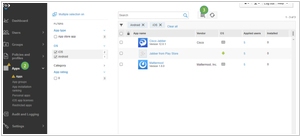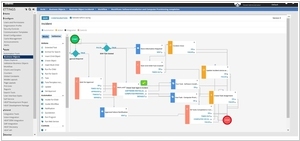BlackBerry UEM vs Ivanti Neurons
August 21, 2023 | Author: Michael Stromann
BlackBerry UEM and Ivanti Neurons represent distinct approaches to endpoint management and security. BlackBerry UEM is renowned for its robust security features, particularly its expertise in mobile device management and secure communications. Catering to enterprises that prioritize stringent security measures, BlackBerry UEM offers comprehensive tools for managing and safeguarding endpoints, especially mobile devices. In contrast, Ivanti Neurons focuses on automation and intelligence-driven IT operations, leveraging AI-powered insights to enhance efficiency and user experience. Targeting organizations seeking streamlined IT management, Ivanti Neurons offers a broader suite of solutions spanning various aspects of endpoint management, including security, asset management, and user support.
See also: Top 10 MDM software
See also: Top 10 MDM software
BlackBerry UEM vs Ivanti Neurons in our news:
2020. Ivanti has acquired MDM provider MobileIron
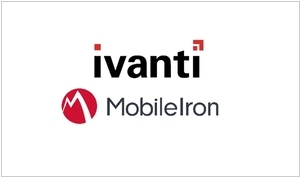
Ivanti, an IT security software company, has successfully completed the acquisition of MobileIron, an Enterprise mobile security firm, at a valuation of $872 million. The MobileIron platform was specifically designed to enhance the security and administration of corporate information in an environment where individuals utilize mobile devices and contemporary endpoints to access cloud data. Established in 2007 by Ajay Mishra and Suresh Batchu, MobileIron introduced the industry's pioneering mobile-centric, zero trust platform grounded in a unified endpoint management (UEM) framework. This distinctive mobile-centric, zero trust methodology from MobileIron guaranteed that solely authorized users, devices, applications, and services had the ability to reach business assets. The company made its initial public offering in 2014, trading on the stock exchange under the symbol MOBL.
2015. Blackberry to acquire mobile device management vendor Good Technology
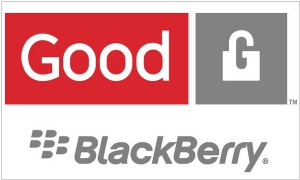
BlackBerry, a company that has seen a significant decline in its global market share for handsets, is continuing to prioritize mobile enterprise security. The company has announced its acquisition of the mobile device management vendor Good Technology for $425 million in cash. Despite BlackBerry's previous position as the undisputed leader in enterprise mobility, the emergence of Apple and Android resulted in the rapid loss of its dominant status. During a press conference, CEO John Chen emphasized the complementary nature of the two companies, particularly in relation to Good's expertise in iOS, an area where BlackBerry is less strong. Chen also highlighted BlackBerry's intention to transition to a subscription-based business model, with the majority of Good's revenue already stemming from subscriptions, providing BlackBerry with an established platform for this shift.
2015. BlackBerry buys Good MDM
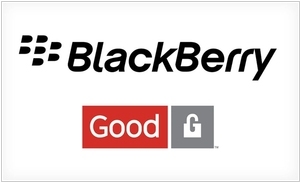
BlackBerry has acquired the oldest company specializing in mobile device management (MDM), Good Technology, for a substantial $425 million. This move comes as BlackBerry's flagship offering, BlackBerry Enterprise Service (BES) 12, has struggled to gain traction in the market. The acquisition also underscores the limited size of the mobile market, as Good Technology, established back in 1996, holds a prominent position as one of the top three MDM providers alongside MobileIron and VMware's AirWatch. BlackBerry has been engaged in persistent efforts to regain its standing in the industry. Despite the technical superiority of its BlackBerry 10 smartphones compared to their predecessors, BlackBerry 7 devices, they have faced rejection from both users and IT professionals. Anticipating this trend, BlackBerry introduced BES10, a revamped version of its management server, aimed at overseeing non-BlackBerry devices like those powered by iOS, Android, and Windows.
2015. BlackBerry acquired file security startup WatchDox
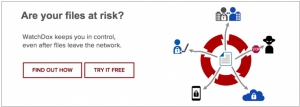
BlackBerry is strategically shifting its focus towards software in order to revive its handset business. In line with this strategy, the company has taken a significant step by acquiring WatchDox, a startup specializing in cross-platform technology for digital rights management (DRM) and secure file sharing in enterprise environments. The intention is to integrate WatchDox's advanced technology as a value-added service within BlackBerry's Enterprise Mobility Management (EMM) portfolio. This integration will be made available through BES12, which supports multiple platforms. With the inclusion of WatchDox's capabilities, along with the previous acquisition of Secusmart, a partnership with Samsung, internal development efforts, and now the addition of WatchDox, BlackBerry has significantly enhanced its ability to secure end-to-end communications encompassing voice, text, messaging, data, and enterprise file synchronization and sharing.
2015. MobileIron introduced new Content Security Service for BYOD world
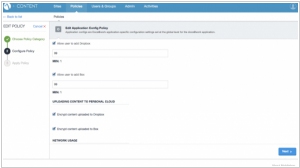
MobileIron has recently introduced its Content Security Service (CSS), which serves as a cloud-based security framework for IT departments. This service enables IT administrators to implement document-level protections across multiple services, even when employees save documents to personal accounts. With CSS, IT administrators can exert control over document security independently from the storage service used. They can set document security measures based on their preferences within a control panel and select the desired services to include. Initially, the service supports popular platforms like Dropbox and Box. The Content Security Service provides robust security measures at various levels. It offers encryption and key management to ensure data protection. It also includes essential data loss prevention (DLP) features such as remote wiping, document expiration controls, and options for saving and sharing. Additionally, an audit trail feature is available to facilitate compliance adherence. Moreover, the service allows for the sharing of encrypted files internally with teams and other employees, enhancing secure collaboration within the organization.
2015. Good launched new Enterprise Mobility Management suite
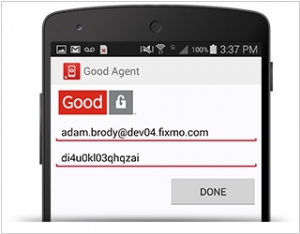
The mobile security solutions provider, Good Technology, has introduced a new platform aimed at simplifying enterprise mobility management (EMM). The recently launched Good Management Suite offers a comprehensive cross-platform solution that combines mobile device management (MDM) functionality with mobile application management, a secure browser, and an enterprise-focused application store. This suite is particularly beneficial for organizations initiating mobile business initiatives and provides a user-friendly solution that can adapt and expand alongside their evolving mobile strategies. The Good Management Suite can be utilized in conjunction with other enterprise mobility management suites within Good Technology's portfolio, granting users access to a unified and straightforward solution. With a pricing model of $3 per user, per month, organizations can efficiently leverage the suite's features to streamline their EMM efforts and enhance mobile security within their enterprise.
2014. BlackBerry partners with Samsung to ensure Android security with Knox and BES
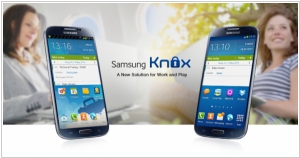
BlackBerry and Samsung have joined forces to enhance the security of Android devices, leveraging the capabilities of BlackBerry's mobile device management solution, Knox, and BlackBerry's BES12. This collaboration allows Samsung and BlackBerry to strengthen their market positions in the face of Apple and IBM's increasing dominance in the enterprise segment. With this partnership, enterprise customers can choose Samsung Knox-enabled devices that can be controlled and managed by BlackBerry's enterprise server software, ensuring a strict separation between personal and corporate data. The collaboration also aims to enhance the core security of Samsung mobile devices, and Samsung will actively promote BES12 to its customer base while BlackBerry includes Knox in its array of product offerings.
2012. Enterprise mobile app stores saving IT admins' lifes
Smartphones and tablets have become no less important business tools than laptops and computers. And it doubled the headache of IT administrators. But the real disaster for them has become BYOD (Bring Your Own Device) - the global revolution led by employees (and most importantly, CEOs) that want to use only their own (favorite) mobile devices for business purposes. At the same time they continue to play games on their smartphones, take them to night clubs, lose them somewhere, buy new ones and bring them to office. The situation is even more complicated because of the wide variety of mobile platforms: iOS, Android, Blackberry, Windows Phone, Symbian. How to ensure security and manage enterprise mobile applications in such conditions? To reduce the suicide rate among IT admins the smart vendors invented Enterprise mobile app stores. ***

